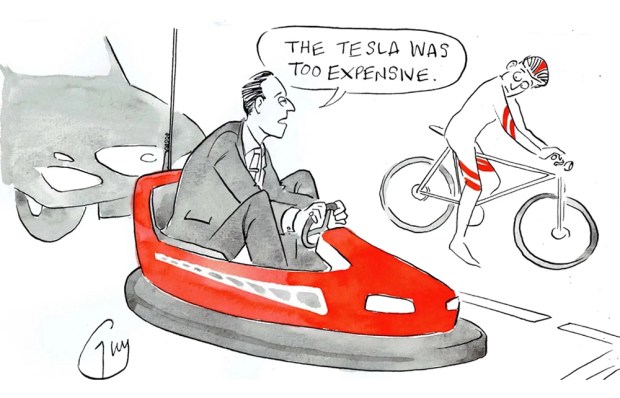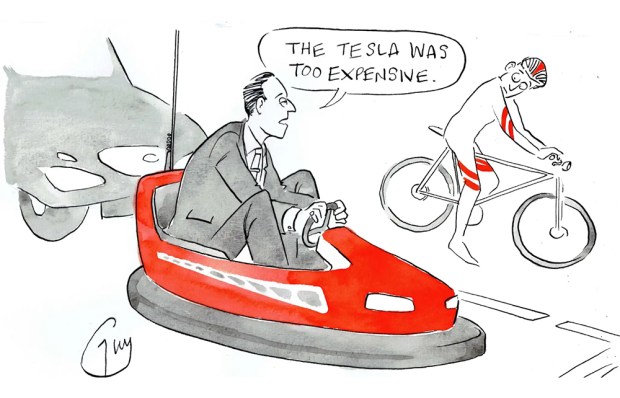Our local Sainsbury’s, though admirable in every other way, has a slightly inflated estimate of the disabled population of Seven-oaks, with all the plum parking spaces near the entrance reserved for blue badge holders. Every time I drive in, a voice from my inner bastard says: ‘Jeez, if it weren’t for all these bloody disabled spaces, I’d be able to park right next to the door.’ This of course is rubbish, because if those spaces were not designated as disabled, other people would have parked in them first.
It is a perfect example of asymmetry of perception. In fact, next time you go shopping, it might pay to adopt the trademark Sutherland method of superstore parking, which is to park as close as possible to one of the trolley return points in the car park. You’ve never done this? That’s asymmetry of perception again: your mind was focused on minimising the first journey you had to make while completely neglecting the second.
It is vital to understand these hidden asymmetries precisely because we are blind to their effects. And without such awareness it is impossible to understand the wonky relationship between objective reality and human perception. For as long as we neglect this, many social and political problems become impossible to solve, or else lead to costly misdirected effort in our futile attempts to solve them.
A few months ago I wrote about the phenomenological problem with smart motorways, which is that their benefits are invisible: no one notices a traffic jam that doesn’t happen. Speaking to the editor of Highways News recently, I heard of a related problem: those seemingly gratuitous 50mph limits imposed on random stretches of motorway often serve to prevent a traffic jam from forming ahead. But because drivers then do not go on to encounter a traffic jam, they come to assume the temporary limits are stupid and start to ignore them.
Here’s another issue. No matter what happens to future funding, the NHS will never be perceived as better than the US health system, even when it is. That is because US hospitals make money from patients, which means it pays for them to trumpet their capabilities, whereas the NHS is funded by government, which means it pays to highlight its problems. I am willing to bet that, even if we were to spend 50 per cent of GDP on health, were an NHS consultant to appear on Newsnight and declare that he was well paid, worked reasonable hours and had access to all the £2 million beepy machines he could wish for, he would be ostracised by his peers and quite possibly kicked out of the BMA.
The same asymmetry leads private schools to spend lavishly on gratuitous facilities – to emphasise their lavish funding – while the state sector has to complain about book shortages and funding shortfalls. Again, I am not saying these narratives are necessarily wrong, only that we should be aware they are distorted. (One of the worst aspects of university privatisation seems to be a deranged fixation with constructing pricey new buildings as an elaborate form of self-promotion.)
A million years before there was fake news or social media, humans, along with most other living things, were already equipped with wonky perception, since it paid us more in evolutionary terms to notice unusual phenomena than boring everyday events. Among humans this bias was further worsened by the invention of language. People do not tell stories about objective facts; they tell stories for effect, or to create maximum excitement. Hence social media is not a new problem but merely makes an existing problem worse. The net effect of this language distortion field is that your dog probably has a more realistic appreciation of his own life than you do. Right now your dog is happy in the moment, not stuck in a suburban bedroom looking at highly edited selfies of other dogs.
Got something to add? Join the discussion and comment below.
Get 10 issues for just $10
Subscribe to The Spectator Australia today for the next 10 magazine issues, plus full online access, for just $10.
You might disagree with half of it, but you’ll enjoy reading all of it. Try your first month for free, then just $2 a week for the remainder of your first year.















Comments
Don't miss out
Join the conversation with other Spectator Australia readers. Subscribe to leave a comment.
SUBSCRIBEAlready a subscriber? Log in